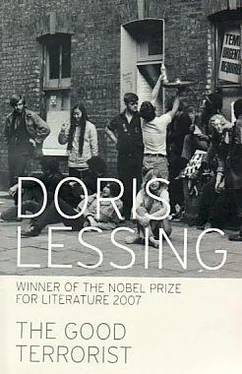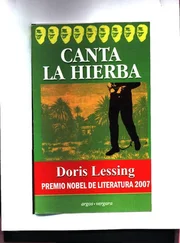What are they doing for money? was Alice's thought, kept to herself. She also thought: When Bert comes back, Pat will not be here. She could read this from Pat's face. But she kept that to herself, too.
That evening a knock - furtive and hasty, telling Alice who it was - brought her out to find Monica on the path near the gate-not outside the door, for the girl had been afraid that Faye might open it.
But, seeing Alice, she approached swiftly, her hungry eyes on Alice's face.
Faye was in the kitchen with Roberta, so Alice shut the door quietly behind her and went with Monica out to the road, and along it to where they were hidden by the healthy bushes of Joan Robbins's garden.
"Did you hear of anything?" Monica asked, already sullen and hopeless, apparently seeing from Alice's face that there was no news. She looked puffy and pale. Her hair straggled greasily. From her came such a whiff of defeat that Alice had to force herself to stand up to it.
"There's nothing to hope for from the Council," said Alice, and, seeing a sneer or snarl of Well, of course not!, persisted, "but I've thought of something else." She asked Monica to stay where she was, sneaked back into the house as though she were guilty of something, came out again with the letter she had written to her mother. Monica had drifted halfway back to the main road, apparently expecting Alice not to reappear.
"Did you think I was not coming back?" she scolded. "Really, if you are going to expect the worst, then that is what you'll get."
A weak, conscious smile.
"Take this to this address. And take your baby with you."
"But it's so late. God knows it's hard enough to get him off to sleep in that place, and he's asleep now."
"Go tomorrow. It's my mother. She likes babies. She likes looking after people."
The doubt on Monica's face did not in any way diminish the total confidence Alice felt. Look what she had achieved with Jim! No, she was on a crest of ability and luck, and she could make no mistakes. She felt that her mother would be good to poor Monica. She said briskly, "It's all right, Monica. Well, it's worth trying, isn't it?"
Peering down dubiously at the envelope, Monica departed to the bus stop in the main road, and Alice went in to join the others around the table. She had prepared a large stew, or thick soup, her speciality, brought to perfection in years of communal living. How many people had joked that Alice could feed crowds out of it! Like the Bible's loaves and two fishes.
How many had come into this squat or that asking, "Any of your soup left, Alice?" and then sat breaking bread into it, handing back their plates for more. No dietary deficiencies in people who lived on her soup! And in times when there had been very little money, it had kept them going, Jasper and her, for months.
Alice slid back into her place, saying, to their querying, ready-for-any-emergency looks, "It's all right, it was nothing."
Roberta and Faye, Mary and Reggie, Philip and Jim, Pat and Alice sat around all evening, compelled into being a family by the magic of that soup, and the red wine that Reggie had contributed, and the good bread, healthy wholemeal, and the frivolous white that Faye insisted on.
This was another evening of pleasure, and Jim was full of tales about Alice's father and the others working with him, twelve or more, and how lucky Alice was to have such a father - while Alice smiled and kept a lock on her tongue.
Next morning Alice was alone in the house when there was a tumult of thudding knocks on the door, and a voice screamed, "Come out, you, come out of there, come out."
Alice went out to Monica, who was transformed by fury, ready to kill, as Alice could see. The child in the pushchair, poor ugly little thing, grizzled steadily.
"Why did you do that? Why did you send me there? What have I done to you?" And Monica began kicking out at Alice's legs, and beating about with her arms.
"What is the matter? What happened? Didn't she take you in?"
"There's no one there," screeched Monica. "Why did you send me there?"
"Well, she's only out shopping, isn't she? She'll be back."
Monica stopped screeching, her limbs stopped flailing, and she stared, appalled, at Alice. "It's an empty house," she said. "No one there. There's a 'For Sale' notice up."
"You went to the wrong house," said Alice, vaguely. She was, indeed, struck by something, a thought, or a memory: cases on a kitchen table, filled with crockery wrapped in newspaper. She stared at Monica, who stared at her.
"There's a mistake," said Alice, who was as pale as Monica, and as breathless by now. "Something's wrong."
"It's you who's wrong," said Monica, with a sudden ugly laugh. She still stared at Alice, as if unable to believe what she saw. "Why did you do this to me? What for? You get some kind of a kick out of it, I suppose. You're evil," she pronounced. "You are all evil and mad in this house." And, bursting into wails, she went running off, pushing and jolting the pushchair so that the child wailed, too. The two went noisily to the bus stop, leaving Alice on the doorstep, stunned, and staring without seeing at the letter she had written to her mother, thrust into her hand by Monica.
Dear Mum,
This is Monica. She is living with her baby in one of those ghastly hotels, you know. Well, if you don't you fucking well ought to know. Why don't you take her in? It's the least you can do. You've got three empty rooms now. Monica and her baby are living in one shitty room, with no place she can cook or anything.
Your daughter,
Alice.
p.s. And there is a husband, too.
She went in and sat on the bottom step of the staircase. Sat there for a long time, her mind blank. Then she began a curious movement, rubbing her hand over her face, as though feeling for something or wanting something. It was quite a hard movement, dragging the flesh this way and that, and it went on for some time, perhaps ten minutes. A task she had to perform, a necessity; an observer could have thought she had been ordered to do this, to sit on that step with her fingers pushing her flesh about over her face.
Then she methodically collected her bag, and went off to the Underground, walked up the streets to her mother's house, and stood outside it looking at the "For Sale" sign. She could not take it in. Using her key, she briskly admitted herself. But inside it was as if something had sucked out furniture, leaving the spirit of the house intact. The cooker was in the kitchen, though the refrigerator was gone. Curtains hung pleasantly in the windows, and it seemed that if she turned her head away and back, then the table where she had sat, where she had served her soup to her mother, sometimes to her mother's guests, might reappear. The rest of the house was the same. In the bedrooms were the curtains she had known all her life, and the fitted carpets remained, but beds and cupboards had been spirited away. Alice went up to her room, and squatted down in the corner where her bed had been, the narrow white bed she had slept in since she was ten years old. On the window was a blue-and-red peacock she had stencilled there on a wet afternoon when the garden was blanked out with grey rain. A 1980 calendar hung on a wall; she had kept it because she liked the picture: Manet's Bar at the Folies-Bergere . She identified with that girl who stared out, trapped by bottles, tangerines, minors, the counter, a wall of people with ugly faces.
In the garden there was sunlight, and cats on a lawn that needed cutting.
She went downstairs, like a sleepwalker. Then, in a frenzy, having come awake, furious, betrayed, deadly, she tore down curtains from room after room, bundled them, and staggered out of the house, forgetting to lock the door, hardly able to walk under the load. She saw a woman looking from a window and thought: So what, they are mine, aren't they? She managed to reach the corner, staggering. She stopped a taxi, returned in it to the house, made it wait while she ran in to drag down any other curtains that remained. Then she was driven back to the squat, where she spent all afternoon putting up her curtains where none had been, or replacing curtains for which she had no feeling. Anyway, these curtains were a thousand times better than the ones off the skips: lovely, real linen or silk or thick velvet, lined and interlined, fringed and tasselled.
Читать дальше











